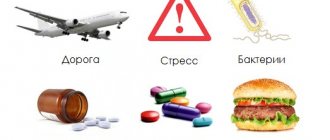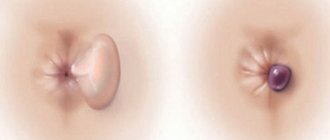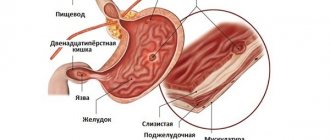Could a cough be due to problems with the digestive tract? Maybe. This phenomenon often occurs in medical practice among people over 30 years of age. The pathology is aggravated by the presence of bad habits: alcohol abuse, smoking.
A cough from the stomach requires special treatment and has a number of nonspecific symptoms that are easily distinguished from a cold. So what is a stomach cough, what symptoms are typical for it and how to choose the right treatment?
What is a stomach cough and what causes it?
If coughing is not accompanied by symptoms characteristic of a cold, such as fever, runny nose, soreness and sore throat, pathology of the digestive tract is excluded.
What is the connection between the cough reflex and stomach diseases? Indigestion is often accompanied by the reflux of stomach contents into the esophagus, the mucous membrane of which becomes irritated and inflamed. This process causes a feeling of discomfort in the chest, which provokes contraction of the larynx.
The disease is characterized by the absence of sputum, which is often replaced by belching. Additional signs are:
- chest pain
- heartburn
- nausea
- general weakness, malaise
More often, attacks are worse at night or in a horizontal position. It is impossible to cure such a pathology with mucolytics or bronchodilators.
It is important! Cough due to problems with the gastrointestinal tract is not isolated as a separate disease; it manifests itself along with other symptoms inherent in diseases of the digestive tract.
Causes
The cause of stomach cough in children is often anomalies in the development of the digestive system. In adults, the cough reflex manifests itself against the background of the progression of the following diseases:
- Gastroesophageal gastric disease (GERD) or gastroesophageal reflux. With gastroesophageal disease, cough occurs immediately after eating and is paroxysmal in nature. There is no sputum, but with a cough reflex, patients experience belching with an unpleasant odor, which is accompanied by pain when swallowing and heartburn. When the pathological process is chronic, contraction of the larynx appears periodically when consuming substances that are aggressive to the gastric environment (sour, spicy, salty). At night, the disease provokes breathing problems.
- Infectious diseases. When the gastrointestinal tract is infected, a long-term manifestation of an unproductive, debilitating cough reflex is noted.
- Enterovirus infection. In addition to cough, it is accompanied by a number of characteristic symptoms, such as vomiting, nausea, diarrhea, abdominal cramps
- Peptic ulcer disease. The cough symptom with a stomach ulcer manifests itself in the same way as with GERD, but 1-2 hours after eating. This phenomenon is associated with increased gastric acidity. With a peptic ulcer, cough is accompanied by a number of specific symptoms, as well as stomach pain
- Gastritis. Lack of a balanced diet, stress, bad habits are the scourge of modern society. This lifestyle provokes dystrophic changes in the epithelial tissues of the stomach, and also changes the acidic environment. Thus, cough with gastritis manifests itself as a symptom of irritated gastric mucosa. In addition, gastritis is accompanied by the following symptoms: an unpleasant taste in the mouth, increased salivation, nausea after eating, appetite disturbances, and stool disorders. The main symptoms, including cough due to gastritis, go away as the disease is treated.
Also, the cough reflex often manifests itself against the background of helminthiasis, dysbacteriosis, with tumor processes in the gastrointestinal tract, with foreign bodies or food poisoning.
Self-diagnosis and treatment of the disease can cause irreparable damage to health. Therefore, if a cough appears, aggravated by painful symptoms in the epigastric region or in the intestines, contacting a gastroenterologist should be done immediately.
Non-infectious causes of the development of pathological reflex process
Cough due to diseases of the gastrointestinal tract occurs in almost 30% of all cases of visiting a pulmonologist. In fact, the problem often has a gastroenterological profile. Under what pathologies is the formation of such a reflex possible?
The first and most common pathological condition is the physiological weakness of the gastric sphincter. The sphincter is a small muscular ring located at the border of the lower esophagus as it passes into the hollow organ itself (stomach).
Such a process cannot always be called pathogenic. Thus, most often in adult patients, stomach cough occurs, which develops at night, while sleeping on the left side.
Physiologically, the human body is designed in such a way that lying on the left side weakens the sphincter. As a result, reflux (reflux of aspiration contents) and intense cough are possible.
The night reflex prevents you from getting a good night's sleep, causing a feeling of weakness and constant drowsiness. Frequent night awakenings and insomnia. But this is the least of the problems.
This phenomenon can end in death when primary asphyxia develops. A person can simply choke while sleeping.
Gastritis with high acidity
It is a common cause of the manifestation in question. The disease is an inflammation of the mucous membrane (epithelium) of the stomach.
The result is a whole complex of pathological manifestations:
- Abdominal pain localized in the epigastric region. They are characterized by medium intensity, aching or drawing in nature, dagger-like discomfort is possible (somewhat less common). The pain intensifies after eating and subsides in the second half of the day.
- Discomfort in the pit of the stomach. A well-known sucking sensation, as if hungry.
- Heartburn. It is a burning sensation localized in the chest and epigastric region. May spread to the throat, partially the oral cavity.
- Belching sour. Sour belching or a similar phenomenon with a taste of rotten eggs.
- Gastritis with low acidity is rarely accompanied by a cough.
Aka reflux esophagitis. He is an absolute record holder in the development of a pathological reflex process of the type in question.
It often lasts for years without visible manifestations, manifesting itself as a cough and minimal symptoms. A person may suffer from GERD, cough and not know why.
However, if you listen to your own body, you can detect the following signs:
- Belching of air after eating.
- Feeling of heaviness in the stomach after eating. It is possible to regurgitate food, especially if the food was fatty or difficult to digest.
- Heartburn.
- Feeling nauseous.
- Vomit.
- Attacks of hiccups.
In severe cases, all symptoms occur simultaneously and are intense.
Intestinal dysbiosis
Indirectly causes the development of pathological processes in the digestive tract and, as a result, a persistent painful cough is formed.
Peptic ulcer
It is a product of the evolution of gastritis and reflux esophagitis. It represents areas of destruction of the mucous membrane of the gastric structures under the influence of highly acidic gastric juice.
Symptoms of stomach cough
It was noted above that the signs, symptoms and treatment of stomach cough directly depend on the etiology of the disease. At the same time, regardless of the stomach disease, a number of common symptoms are identified:
- breathing problems that worsen when lying down
- cough reflex after eating
- discomfort in the throat: soreness, burning
- bad taste, bad breath
- dysmotility of the gastrointestinal tract: vomiting, nausea, belching, heartburn
- stool disorders: diarrhea, constipation, bloating
- chronic fatigue syndrome, malaise
Such symptoms in the anamnesis more accurately differentiate gastric pathology.
Stomach cough: symptoms in children
Digestive tract disorders in gastrointestinal diseases in children, especially primary school and preschool age, are difficult to diagnose symptomatically. This is due to the fact that it is more difficult for the baby to describe his feelings. Therefore, parents need to pay attention to the following signs:
- wheezing and irregular breathing, especially during sleep
- bluishness of the face due to difficulty breathing
- increased cough reflex at night
- bloating, flatulence, accompanied by abdominal pain
If the urge to cough cannot be treated with expectorants and is accompanied by symptoms of pathology of the digestive organs, parents should immediately contact a medical facility for a detailed diagnosis of the cause of the child’s cough.
Associated symptoms
https://youtu.be/CVTvv6YlFGY
Stomach cough does not constantly bother the patient. The symptom appears only when interacting with certain extraneous factors. The symptom is usually associated with food intake.
Stomach coughing occurs immediately after eating or after a short period. It intensifies when the patient takes a horizontal position and at night. The symptom cannot be eliminated using traditional cold medications. It is possible to suspect the presence of a specific pathology by paying attention to the clinical picture. A description of the violations is presented in the table.
Coughing is often caused by the presence of parasites in the body. With helminthiasis, the patient complains of a significant loss of strength, anemia and deterioration of the condition of the skin. Hair becomes brittle and dull. The nail plates are peeling. There is increased gas formation, insomnia occurs, the stomach is bloated, and there is a dry cough. The patient regularly experiences diarrhea.
All of these diseases have a similar clinical picture, so it is impossible to independently determine the root cause of stomach cough.
Diagnostic methods
Making an accurate diagnosis and identifying the cause of the cough reflex is carried out by a doctor by collecting information in the anamnesis, as well as through a series of laboratory and clinical studies. Modern diagnostic methods include the following studies:
- fibrogastroscopy
- echoscopy of the peritoneal organs
- Ultrasound of the gastrointestinal tract
- X-ray of the respiratory tract
- MRI of the digestive tract
The following tests are also required:
- urine
- blood (general, biochemistry)
- feces (for eggworm, sowing tank, coprogram)
Only timely diagnosis and treatment of pathology will help give an objective assessment of the patient’s health and relieve him of coughing.
Diagnostic measures
Determining the source of the problem is quite difficult. It is necessary to carry out a differential diagnosis with dozens of pulmonary diseases, as well as to distinguish some conditions from others within the framework of gastroenterology.
First of all, it is recommended to consult a pulmonologist.
At the initial consultation, it is important to clearly and unambiguously talk about your own complaints; the doctor collects an anamnesis and examines the family history of illnesses. You need to get as much information as possible.
Next, a series of functional breathing tests is performed. It is important to determine whether there is a disturbance in normal pulmonary function.
The following studies are shown below:
- X-ray of the chest organs.
- Bronchoscopy.
- General blood analysis.
- Biochemical study of venous blood.
If the results of such examinations do not show any abnormalities, you need to visit a gastroenterologist. The study of the patient’s gastroenterological status includes the following procedures:
- FGDS.
- Analysis of gastric juice.
- Ultrasound of the abdominal organs.
With a high degree of probability, changes in the nature of the gastrointestinal tract activity will be detected.
Treatment methods for stomach cough in adults and children
How and with what to treat stomach cough? If your stomach hurts when you cough or your stomach hurts when you cough, drug therapy and traditional methods of treatment come to the rescue.
It is important! The use of medications, as well as the use of traditional medicine methods to eliminate cough and intestinal pain, must be agreed upon with the attending physician. Self-treatment can aggravate the symptomatic picture and harm the patient’s health!
Treatment tactics are aimed at eliminating the root cause of the cough symptom, alleviating pain in the gastrointestinal tract, and normalizing general well-being. Most often they are treated with medications. Surgical intervention is indicated only for advanced forms of the disease or when traditional treatment methods are ineffective.
Drug therapy
The list of medications includes:
- antibacterial and antiviral agents depending on the type of disease
- antacids to reduce stomach acidity
- drugs to reduce the production of gastric secretions
- probiotic preparations to normalize intestinal microflora
- prokinetics - means to improve the motility of the digestive tract
- foaming drugs are actively used in the treatment of peptic ulcers and gastritis
In addition to basic medications, the standard treatment regimen includes drugs to normalize respiratory function.
Also, a mandatory point in the treatment of stomach cough is strict adherence to the diet according to table No. 1. The diet includes:
- enriching the table with fruits and vegetables
- eating steamed food
- avoidance of “fast” carbohydrates that irritate the stomach
- split meals in large portions
Strict adherence to medical recommendations and adequate therapy contribute to a speedy recovery and also help to avoid relapse of the disease.
Prevention
Preventive measures consist of following simple recommendations:
- You should not eat 1.5 hours before bedtime.
- You cannot wear tight clothes.
- It is advisable to sleep on a high pillow.
- Smoking is strictly prohibited, as is drinking alcohol.
- You should not eat aggressive foods (fatty, fried, overly salty, spicy, etc.).
Stomach cough can be a big problem, significantly reducing the patient's quality of life. It is necessary to identify the root cause of the condition as quickly as possible and begin treatment.
Could a cough be due to problems with the digestive tract? Maybe. This phenomenon often occurs in medical practice among people over 30 years of age. The pathology is aggravated by the presence of bad habits: alcohol abuse, smoking.
A cough from the stomach requires special treatment and has a number of nonspecific symptoms that are easily distinguished from a cold. So what is a stomach cough, what symptoms are typical for it and how to choose the right treatment?
Folk remedies
Traditional medicine methods are successfully used in the treatment of stomach cough. They harmoniously complement basic treatment and do not require any special physical or material costs.
It is important! Folk remedies are used only as an addition to the main treatment, but in no case replace it! Review of popular tools:
- For the treatment of diseases of the gastrointestinal tract, it is useful to drink potato juice. Take the juice in the morning, 100 g before meals.
- Taking mumiyo also provides benefits. A match head of the substance is added to warm milk. You need to drink this remedy twice a day.
- Decoctions based on herbs: chamomile, plantain, sage, licorice will help normalize respiratory function and eliminate symptoms of the gastrointestinal tract.
- Treatment of the disease is supplemented with a mixture of honey and olive oil. The proportion is taken 1:2.5. It is recommended to add a couple of teaspoons of lemon juice to the mixture. Store the home remedy in the refrigerator and take a teaspoon before each meal.
In the future, folk recipes are used for preventive purposes.











